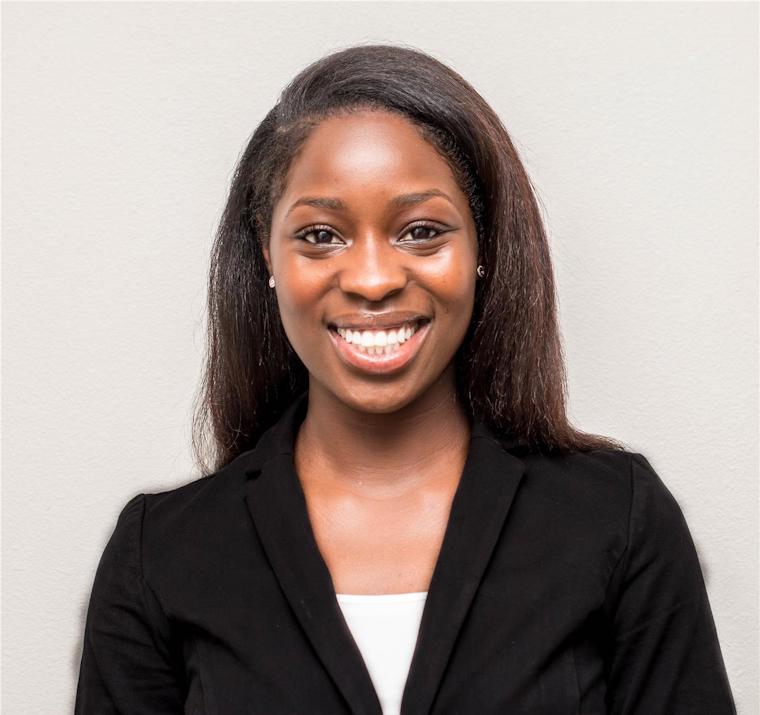This post is part of our series, Behind the Poster, in which we interview poster presenters from the recent ACGME Annual Educational Conference about their research.
Lorene Cudjoe and co-author Dr. Laurel Fick wanted to look into how mentorship could help students identifying as racial or ethnic minorities match more successfully into their specialty of choice. Their poster, Increasing Diversity and Inclusion in Graduate Medical Education through Mentorship, highlights the program they designed to pair volunteer mentors with medical students preparing for the Match. We asked Ms. Cudjoe about the inspiration for the project, what they discovered in its first cycle, and what other plans they have for it moving forward.
Primary Author: Lorene Cudjoe
Co-Author: Laurel Fick, MD, FACP
ACGME: Tell us about your academic and professional role.
Cudjoe: I am currently an MPH candidate at Johns Hopkins University in between my third and fourth years of medical school at Marian University College of Osteopathic Medicine. Amongst other things, I am passionate about increasing diversity in medicine and exploring ways to decrease health disparities seen amongst racial/ethnic minorities. My passions led me to becoming my school's chapter President of the Student National Medical Association (SNMA) and later the Region V SNMA Community Service Liaison. Currently, I am working on a couple research projects and looking forward to applying to residency this fall!
ACGME: Can you briefly describe your project for us?
Cudjoe: Our project was an initiative that resulted from a collaboration between the Region V SNMA and Ascension St. Vincent Indianapolis Residency Programs. The project was created to help students that identified as a racial/ethnic minority successfully match into the specialty of their choice. The project involved three parts: a virtual Q&A session about residency applications and the Match; personalized residency application feedback; and a virtual mock interview. This project would not have been possible without the incredible volunteer attendings, program directors, and residents of Ascension St. Vincent Indianapolis who were paired with students for the second and third parts of our project. The volunteer mentors were paired with students on the basis of specialty to ensure that feedback and mock interviews were tailored to the specialty students were applying to.
ACGME: What inspired you to do this project?
Cudjoe: After previously expressing an interest in collaborating with SNMA to increase diversity in medicine, Dr. Fick found it fitting to reach out to me this summer to help design a program that would begin to do just that. Additionally, for the medical community at large, the heightened awareness of the systemic racial injustices that plagues our institutions unveiled the racism that has long existed in medicine. Statistics show that physicians of racial/ethnic minorities are not reflective of the racial makeup of our nation even though studies show that the outcomes of patients who identify as a racial/ethnic minority are positively influenced by having a physician of the same racial/ethnic background as their own. As such, we wanted to develop a program that would help minorities successfully match into specialties of their choice.
ACGME: What did you discover?
Cudjoe: We discovered that overall students were satisfied with the program. Not only did students state they would recommend the program to students in the future, but our volunteer mentors also stated they would like to volunteer again next year.
ACGME: What was the main takeaway?
Cudjoe: There are feasible ways we can all begin to chip away at the racism built into the health care and medical education systems. Mentorship can be a way to begin to diversify medicine. We also believe partnering with organizations, such as SNMA, can help connect under-represented in medicine (URiM) students to residency programs to help ensure they successfully match into specialties of their choosing.
ACGME: Who could benefit from this?
Cudjoe: Patients, residency programs, and all medical students can benefit from this program. Diversity does not only benefit minority students, but the perspective they bring into programs, and the patient outcomes they are able to achieve in communities that reflect their own benefits us all.
ACGME: Any additional follow-up plans?
Cudjoe: Our follow-up plan is to retrieve information on how the Match went for our first set of students and to see what we can do to increase student response on surveys to get a better idea of how effective our program is and can be.

